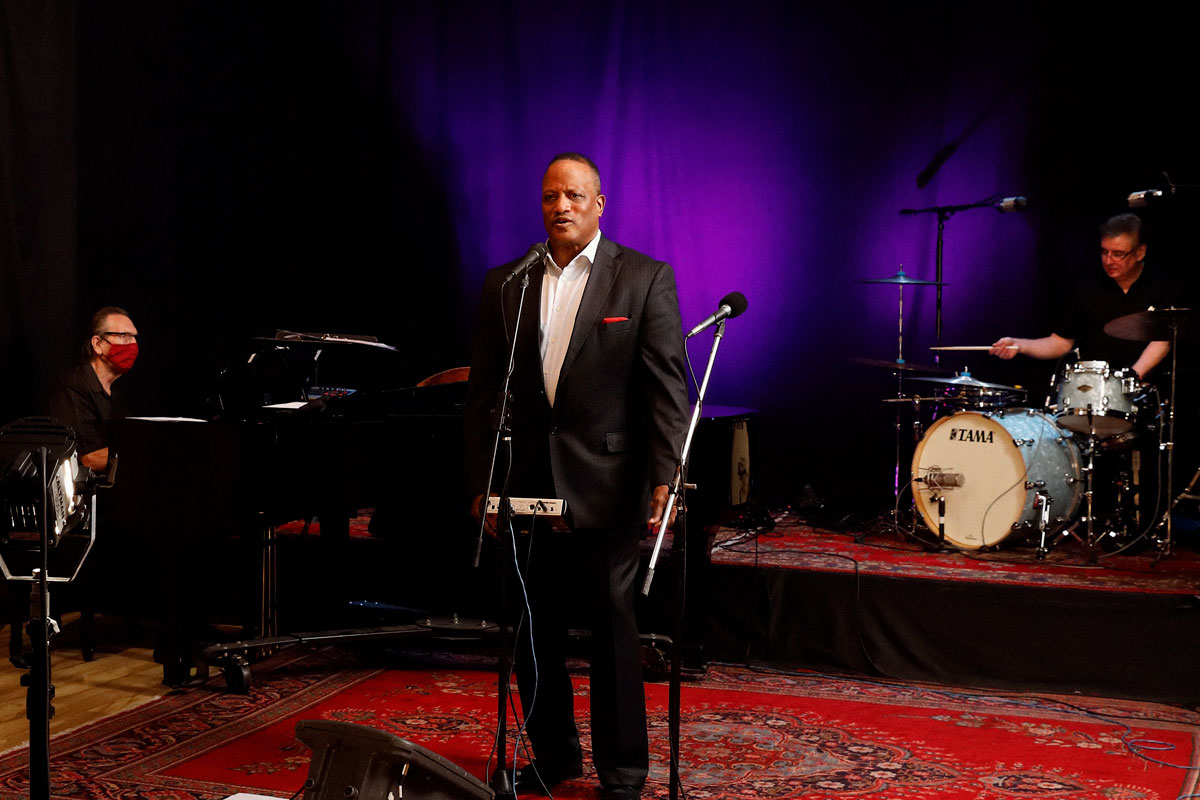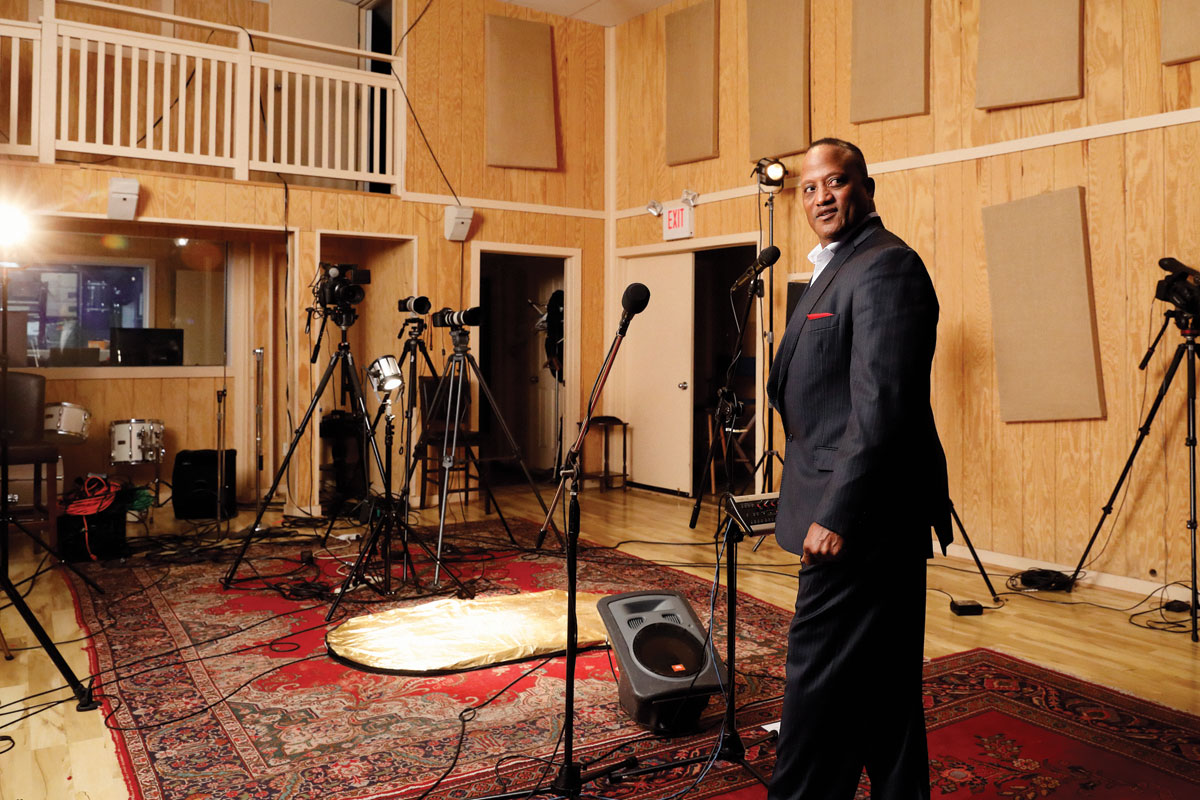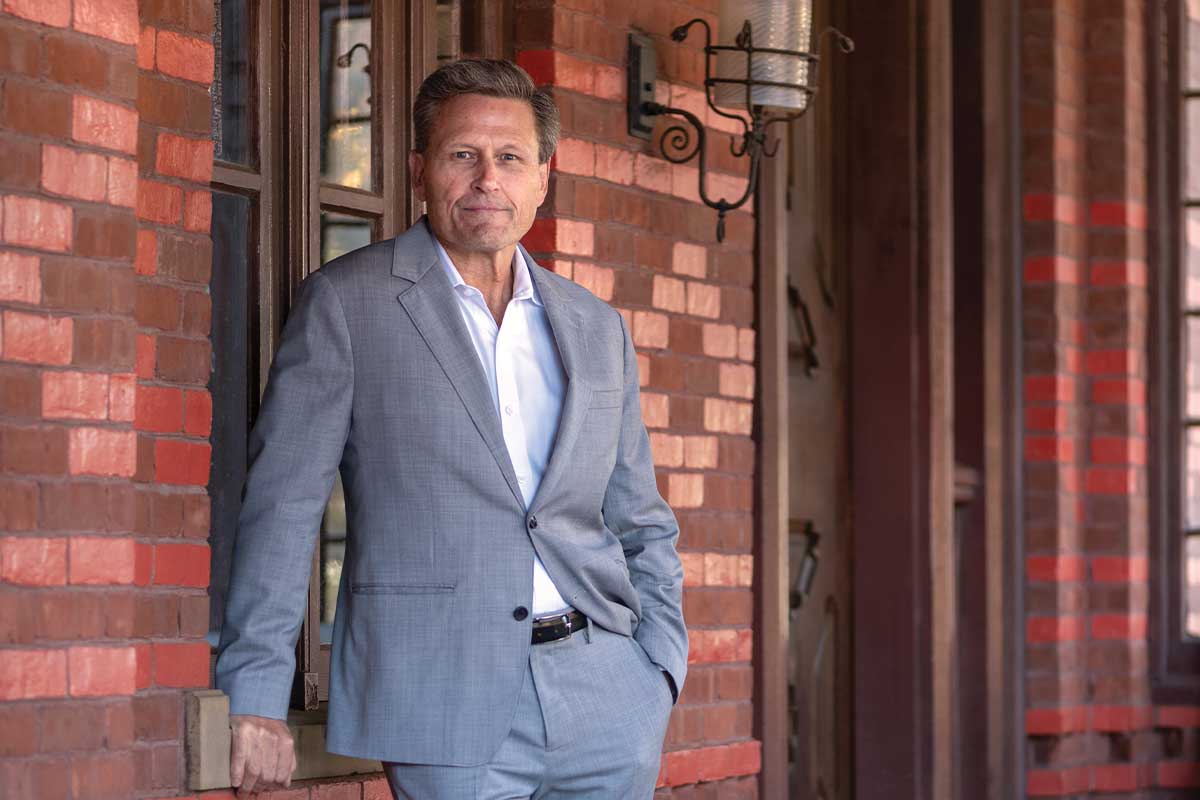As an agent with the Bureau of Alcohol, Tobacco, Firearms and Explosives in Falls Church investigating firearms trafficking in the late 1980s, Rob Patrick, 58, remembers arresting some of the first East Coast Crips, a gang notorious for extortion and murder and using weapons like 9 mm TEC-9s and Uzis.
“They were major players distributing crack cocaine in the area. We caught them with a boatload: crack worth six figures, money stored in spare tires. They dressed well, very clean-cut, well-spoken; you’d never know. But they had these distribution lists and ledgers,” Patrick recalls.
Now, over 30 years after first taking 9 mm TEC-9s, Uzis and AKs away from violent gangs, he’s singing “The Way You Look Tonight” into a microphone. Just blocks from his old ATF office on West Broad Street, he’s making his second CD of American classics at Cue Recording Studios. He finalized his first, Songs For You, there in 2017.
“I never saw this coming as an agent. I’m more shocked than anyone,” says Patrick.
“That’s Life”
Growing up in Philadelphia, Patrick (a last name he uses as a stage name) sang in a middle school choir and took piano lessons. His father played Frank Sinatra and jazz records, and they watched Rat Pack variety hours together, but that was the extent of music’s grip on him then. A 6-foot-2-inch wrestler at Penn State who majored in administration of justice, he started his career as a criminal investigator as an agent with the Environmental Protection Agency Office of Inspector General, and then the ATF in 1987.
When asked about crime-fighting in NoVA back then, he speaks calmly as he tells of a Quantico-area dealer’s firearms turning up in DC crimes often. They surveilled a transaction and followed the suspects’ cars up Interstate 95. Before they crossed into Maryland, unmarked ATF cars blockaded the gunrunners. “The suspects put their hands in the air, and everything stopped. We had them boxed in.”
His steady voice doesn’t even rise an octave when he adds it was rush hour. In Springfield. At pre-Mixing-Bowl I-395/I-95/I-495. Gridlocks get ugly, but he remembers cheers instead. “Once people saw ATF jackets, people were honking, giving thumbs up.”
Mostly, though, he recalls their convictions for criminals who purchased guns out of state for drug trafficking crimes using a straw purchaser, in this case a young woman dependent on drugs. They also had criminal histories and were prohibited from possessing weapons. One was wanted for homicide in New York.
“It was great to have an impact on violent crime, to make neighborhoods safer [by] getting guns off the street,” says the former resident of Alexandria and Arlington. “It was dangerous but also satisfying because everyone’s safer when our agents are effective.”

“As Time Goes By”
Over time, he moved up, working managerial positions and rising through ATF headquarters in DC—even meeting President Barack Obama, Hillary Clinton and Department of Justice officials Janet Reno, Eric Holder and Louis Freeh—and the fed needed to de-stress. To unwind, he gravitated toward live music venues. One night at an open mic at Le Canard in Vienna, his friend egged him on. He considered the dare. Thanks to Dad, he knew some Sinatra songs.
“I was absolutely nervous,” he says. “It took me a drink or two. I wasn’t a confident singer. It takes a lot to perform in front of people you don’t know.” To his surprise, it was well received.
So he returned. Patrons’ kind comments encouraged him. He tried open mics at piano bars and lounges like Serbian Crown in Great Falls and Pistone’s in Falls Church.
The music helped him relax. “The way the music affects you, the impact it has on everyone just there to listen—it’s healing in a way, to the singer and the audience,” Patrick says. “That’s why I came back. I loved the way music made me feel.”
He remembers singing the same few songs, like “Send in the Clowns.” People said his vocal tone reminded them of Sinatra; he says that’s because he sings in D flat, which was Sinatra’s signature key. But he just liked how anyone could understand Sinatra’s diction and interpretation of lyrics.
“He made you feel like the song was for you, or about you, so I tried to bring that to the song, make it personal for the listener,” he says. “He didn’t write songs but interpreted them so you understood it and could communicate what you were feeling.”
He was hooked, and over the years he learned more songs from singers of the golden age: Perry Como, Dean Martin, Sammy Davis Jr., Ella Fitzgerald. But when asked to sing at an American Cancer Society fundraiser with a 16-piece band, he realized songs’ healing power. And when a friend’s family asked him to sing at his memorial service, it wasn’t about him anymore. It was a comfort he could give.
“This Town”
Meanwhile at the ATF, he earned promotions, working at ATF headquarters in DC and later moving to Louisville, Kentucky. He moved to Miami for the No. 2 assistant special agent in charge spot and finally to Canada to serve as the country attache and deal with firearms and counterfeit tobacco smuggling.
There, singing at open mic night at a Sheraton one evening in Ottawa, he let himself feel the applause. “This is when I knew it was time to go,” Patrick says. “I was having more fun doing this than working. The job just wasn’t the same kind of joy.”
In 2012, at 50 years old and after 27 years of public service, Patrick retired. He moved back to NoVA, immersing himself in developing as a singer. He took private lessons and vocal jazz workshops, learning about song construction, phrasing and pitch energy. He studied legends like Ella Fitzgerald, Sarah Vaughan and Joe Williams. He went to Wolf Trap and Blues Alley. He interviewed musicians and studied artists’ song versions on YouTube.
“The goal was to improve,” he says. “I needed to develop more confidence and expand my repertoire. Like in a classroom, you learn from questions you hear … musicians here are incredible encyclopedias of music.”
Through word of mouth, he scored gigs at weddings, retirements, charity events and a corporate event for 500 people; he performed at Mr. Henry’s, Epicure Café and Blues Alley, and he’s been booked at a semimonthly gig at Normandie Farm in Potomac, Maryland. Respectable, considering that since 2014, his day job has been serving as director of school security for DC Public Schools, which means overseeing security policy, equipment and emergency planning and guidance, with a $23 million contract, 7,000 cameras in 116 schools and weapons screening equipment. It’s a highly rewarding job keeping kids safe, yet it’s obviously “very high-pressure,” he says. “On the local level, it’s more intense—schools, parents, staff, kids—than ATF.” He has balanced that stress by performing 150 weekend shows so far.
“What makes him successful is his rapport with the audience,” says chef Cary Prokos, owner of Normandie Farm, where Patrick has played twice a month for five years. “He talks to people, makes them feel special. I’ve been here for 37 years, and that’s what we do here.” Prokos laughingly warns of Patrick’s bad jokes but says: “He’s endearing to people. People genuinely like him. He’s calm.” The Sinatra songs are “pretty much right on. People dig it. We’ve a great time with Rob. I tell him he’s the king.”
Patrick describes the show as “a cabaret feel” with a focus on the standards. They also cover a few songs by the Beatles, Billy Joel and James Taylor, as well as show tunes like “The Surrey with the Fringe on Top.” At holiday time, they include carols and a jazzy “God Rest Ye Merry Gentlemen.” “People love that one because … it’s a new twist, relevant,” he says. “You can do that with great timeless music; it’s all about artists’ interpretation.”
But people respond best to Sinatra music. “They love ‘The Way You Look Tonight,’ ‘Strangers in the Night,’ ‘My Way,’ and everyone wants to hear ‘New York New York.’” After one show, he says, a regular told him: “I’m an old man. I have health problems. But when I hear you, I don’t remember my problems. I feel young and healthy.”
He’s built friendships though music, such as one regular couple, a pair of ballroom dancers who tried teaching him the rumba and tango, he chuckles. Others call to check on him. He praises the accomplished musicians backing him up: pianist Wade Beach, drummer Alan Dale and bassist David Jernigan.
“Rob has a unique connection with the audience,” says Beach, who has performed at The Kennedy Center, Constitution Hall and Carnegie Hall and is retired from the United States Air Force Band. “We love playing good music and having fun, and the audience picks up on that. He adds humor. Sinatra’s his forte, though.”
Patrick credits his late friend Don Burns, owner of a dry-cleaning business in Great Falls for 67 years who loved piano bars and inspired Patrick with his style. “He’d tell me about writers, song histories, but he was also a showman … I saw how endearing it was to other patrons, so I incorporated how he connected to the audience. He wasn’t a great singer, but he loved the music. He could sell the song.”
Ann Todaro of Reston, who sings blues, jazz and country and has performed in local venues such as Ice House Café in Herndon, saw Patrick’s generous spirit with other vocalists when he invited her on stage at a show. She sang a swing blues/jazz standard. “What a treat,” she says. “Rob’s an accomplished, charismatic performer backed up by a wonderful group of jazz musicians. He keeps his eclectic audience entertained with his jokes. It was such fun.”
Todaro’s sister, Claire Todaro of Reston, who attended gigs regularly pre-pandemic, agrees. “I’ve known Rob since the early ’90s when were employed together, but back then I had no idea what a talented singer he was,” she says. “He puts on an entertaining show.”
“When I think about where I started, where I am and that I have a following, wow,” Patrick says. He was “shocked” when someone approached him at a Wolf Trap concert, saying he’d seen him on New Year’s Eve. “He recognized me when we’re both there to enjoy Tony Bennett. When people have a good time, it’s an amazing thing; they appreciate what you worked hard on.”
“Young at Heart”
For inspiration, Patrick looks to Bennett, who is still singing at 94. Like a classic song still relevant, we’re all evolving, so keep learning, avoid complacency and follow your dreams at any age, he says. For those pursuing their passions in Act Two: “Surround yourself with people who’ll help you grow, evolve and support your interests … musically, spiritually, emotionally.” He adds: “A lot of people will discourage or compare you to others, but that’s not what it’s about. It’s about developing something special to you that brings other people happiness.”
Beach, a professor of jazz education at George Mason University, teaches people like Patrick who’ve had successful careers in his Falls Church home studio. He helps them tap into what they connect with musically.
“They’ve a desire to play music,” Beach says. “It’s been in the back of their mind all along. They reach retirement age and decide it’s time to get started. Most aren’t looking to make it into a career, but they enjoy it.” This is key, he advises. “If you’re not having fun, you’re not going to be successful. It’s something you must enjoy.”
“I think music has softened me, made me a bit more humble, and the school security job made me realize what’s important,” says Patrick. “I thought I was a big shot being a federal agent, but what’s important to people is their kids and music. I’m proud of the work I did with ATF, but I hope people remember the music more than ‘he was a federal agent.’”
Still, since he’s made the public’s safety his entire career at ATF and DCPS, is singing nostalgic music another way to help people feel safe? He pauses, considering the question intently. “I don’t know if I’d say that. Music makes people comfortable. Music makes us all feel. It’s like therapy for me. Music inspires me … and it makes others happy. It’s this medium that connects people.”
Maybe that connection is why when he sings “Fly Me to the Moon,” he thinks of his dad, who died last year. They’d come full circle: The father who introduced it to his child was so proud to hear his adult son sing it on a CD. Maybe singing a loved one’s song is a way to say thank you to them.
Patrick sums it up in the calm, steady voice of a security official, or perhaps a Chairman of the Board. “People are just drawn to music they grew up with, that reminds them of happy times with family and friends.”
You can currently see Patrick perform at Normandie Farm Restaurant in Potomac, Maryland, on select Saturday nights. Reservations are required, and COVID-19 safety precautions are enforced, including wearing masks and social distancing.
This story originally appeared in the December issue. For more stories like this, subscribe to our monthly print magazine.





